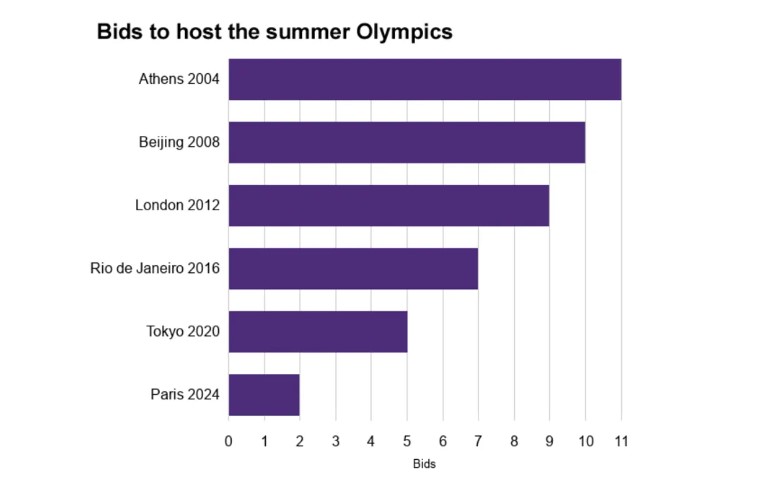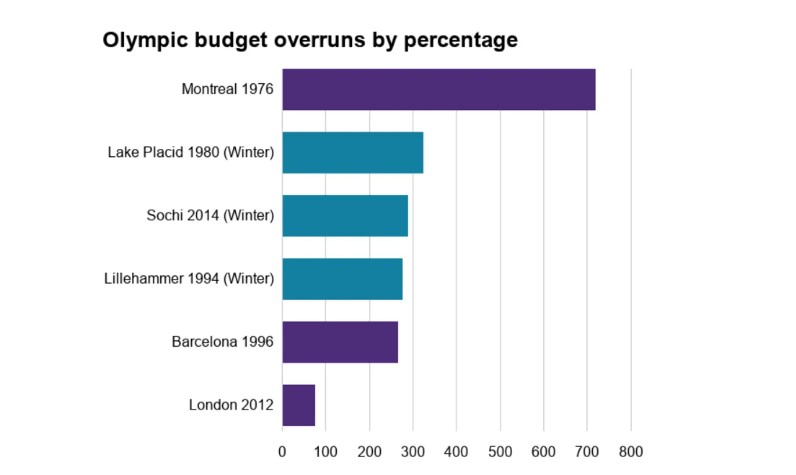For decades, the Olympic Games have been lauded as the greatest show on Earth. Both the summer and winter editions of this event are multi-billion dollar spectacles that bring together the world’s elite athletes and attract massive media coverage.
However, in recent years, a troubling trend has emerged: fewer cities are stepping forward to bid for the privilege of hosting these games. The root cause of this decline lies in the economic realities that often follow in the wake of the Olympic torch.
Look at this graph:
Also read: Best Olympic World Records

Credit: BBC
The Huge Economic Impact of Hosting the Olympics
The overwhelming consensus among economists and urban planners is that the economic impact of hosting the Olympics tends to be far less positive than initially anticipated.
In fact, most host cities have found themselves saddled with crippling debt long after the closing ceremonies. This fact has led many to conclude that cities lacking the necessary infrastructure may be better served by refraining from the bidding process altogether.
The Exorbitant Price of Olympic Aspirations
The financial commitment required to host the Olympic Games is staggering, far surpassing even the considerable expenses associated with the bidding process.
Recent Olympic hosts provide examples of the enormous costs involved:
– London 2012: Spent $14.6 billion, with $4.4 billion coming directly from taxpayers.
– Beijing 2008: An eye-watering $42 billion total expenditure.
– Athens 2004: $15 billion, a sum that would later contribute to Greece’s economic crisis.
– Sydney 2000: $4.6 billion, with taxpayers covering $11.4 million.
– Rio de Janeiro 2016: Over $20 billion, straining an already fragile economy.
Check this Olympic Budget Overruns

Credit: BBC
When a city secures the right to host the Olympics, it must embark on a massive infrastructure overhaul.
This typically includes expanding road networks, upgrading or building new airports, and constructing rail lines to accommodate the influx of visitors. The Olympic village, capable of housing thousands of athletes, must be built from scratch.
Additionally, the International Olympic Committee mandates that host cities have at least 40,000 hotel rooms available, along with state-of-the-art facilities for each sporting event.
These infrastructure costs alone can range from $5 billion to an astounding $50 billion, depending on the existing state of the host city’s infrastructure and the ambition of its Olympic plan.
Benefits of Hosting the Games
Proponents of hosting the Olympics often point to several potential benefits, though the reality often falls short of these lofty expectations:
1. Temporary Job Creation
Host cities typically experience a boost in employment due to the massive infrastructure projects and event preparations. However, these jobs are often short-lived.
For instance, Rio de Janeiro constructed 15,000 new hotel rooms for the 2016 games, providing temporary employment in the construction and hospitality sectors.
2. Long-term Infrastructure Improvements
Some Olympic investments continue to benefit cities long after the games conclude.
Sochi, Russia, for example, invested approximately $44.3 billion in non-sports infrastructure for the 2014 Winter Olympics. Similarly, Beijing spent over $22.5 billion on roads, airports, subways, and rail lines for the 2008 games, along with nearly $11.25 billion on environmental cleanup efforts.
3. Tourism Boost:
Host cities typically see an influx of sponsors, media personnel, athletes, and spectators for six months before and after the Olympics, potentially bringing in additional revenue.
The Drawbacks of Olympic Hosting
Despite these potential benefits, the drawbacks of hosting the Olympics often outweigh the advantages:
1. Overstated Job Creation
The employment boost is frequently less significant than projected. Salt Lake City, host of the 2002 Winter Olympics, added only 7,000 jobs, about 10% of the number officials had initially promised.
Moreover, many of these jobs went to already employed workers, meaning unemployment rates often remain largely unchanged.
2. Revenue Leakage
A substantial portion of the profits generated by construction firms, hotels, and restaurants often flows to international companies rather than benefiting the local economy.
3. Imbalanced Cost-Benefit Ratio
Olympic-generated income typically covers only a fraction of the expenses incurred. For instance:
– London 2012: Brought in $5.2 billion vs. $18 billion in spending
– Vancouver 2010: Generated $2.8 billion after spending $7.6 billion
– Beijing 2008: Earned $3.6 billion while spending over $40 billion
As of 2016, Los Angeles stands as the only host city to have turned a profit from the games, largely due to its ability to utilize existing infrastructure.
The Burden of Olympic Facilities
The financial strain of hosting the Olympics doesn’t end with the closing ceremony. Many purpose-built Olympic venues become ongoing expenses for host cities:
– Sydney’s Olympic stadium costs $30 million annually in maintenance.
– Beijing’s iconic “Bird’s Nest” arena requires $10 million each year for upkeep.
When cities borrow to finance Olympic construction, the repayment can stretch on for decades.
Montreal, for example, didn’t finish paying off its debt from the 1976 games until 2006. In some cases, the facilities themselves become obsolete or abandoned, as seen in Athens, where many venues from the 2004 Olympics now sit empty, silent monuments to economic miscalculation.
Case Studies in Olympic Economic Impact
Look at these case studies:
1. Montreal 1976
At the time, Montreal was experiencing a surge in its global profile, buoyed by the success of Expo ’67. The Olympics were seen as another opportunity to cement its world-class status.
However, the organizing committee’s initial budget of $360 million proved woefully inadequate, with final costs ballooning to $1.6 billion. This fiscal disaster left a 30-year legacy of debt for the city, with many custom-built venues falling into disrepair.
2. Athens 2004
Some economists trace the origins of Greece’s ongoing financial woes to the 2004 Athens Olympics. With a final price tag of approximately $15 billion, far exceeding the original budget, these games epitomized excess and fiscal irresponsibility.
A significant portion of the cost overrun was attributed to increased security measures implemented in the wake of the 9/11 attacks.
3. Rio de Janeiro 2016
The Rio Olympics faced a perfect storm of challenges. The Zika virus outbreak led many athletes to withdraw and deterred spectators. Despite the addition of 2,000 healthcare professionals for the games, Brazil’s ongoing debt crisis strained the healthcare system.
Environmental concerns also plagued the event, with scientists determining that water used for aquatic events was contaminated with raw sewage and antibiotic-resistant bacteria.
Brazil had already lost an estimated $7 billion in tourism due to Zika before the Olympics. The final cost to the Brazilian government was approximately $13.1 billion for hosting (exceeding the budget by $3.5 billion) plus $8.2 billion in infrastructure upgrades.
4. Tokyo 2020 (2021)
Japan won the right to host the 2020 games with a bid of $12 billion. However, the COVID-19 pandemic forced a postponement to 2021, adding $2.8 billion to the total cost.
The final estimated expense exceeded $15 billion, making it the most expensive Olympics in history. The decision to bar spectators due to ongoing pandemic concerns meant that the anticipated boost from international tourism never materialized, leaving the Japanese government to shoulder the bulk of the costs.
The Future of Olympic Hosting: A New Approach for Paris 2024 Olympics?
As cities become increasingly wary of the potential economic pitfalls associated with hosting the Olympics, some are adopting more conservative approaches.
The upcoming Paris 2024 Olympics aims to buck the trend of overspending by utilizing 95% existing or temporary infrastructure. With a budget of approximately 8 billion euros ($8.2 billion USD), Paris is attempting to demonstrate that hosting the Olympics can be done more sustainably and economically.
In a January 2024 interview, the CEO of the Paris Games organizing committee expressed confidence that they were on track to meet their cost goals.
Étienne Thobois, managing director of Paris 2024 said:
“So far we’ve been able to keep a relatively stable budget aligned with inflation…We still have some contingency available.”
The Olympic Dilemma
Hosting the Olympic Games presents a difficult set of challenges and potential rewards for cities. While the prestige and global attention are undeniable, the economic risks are substantial and often underestimated.
Unless a city already possesses much of the necessary infrastructure and can realistically project a positive economic outcome, the wisest course of action may be to admire the Olympic spectacle from afar.

